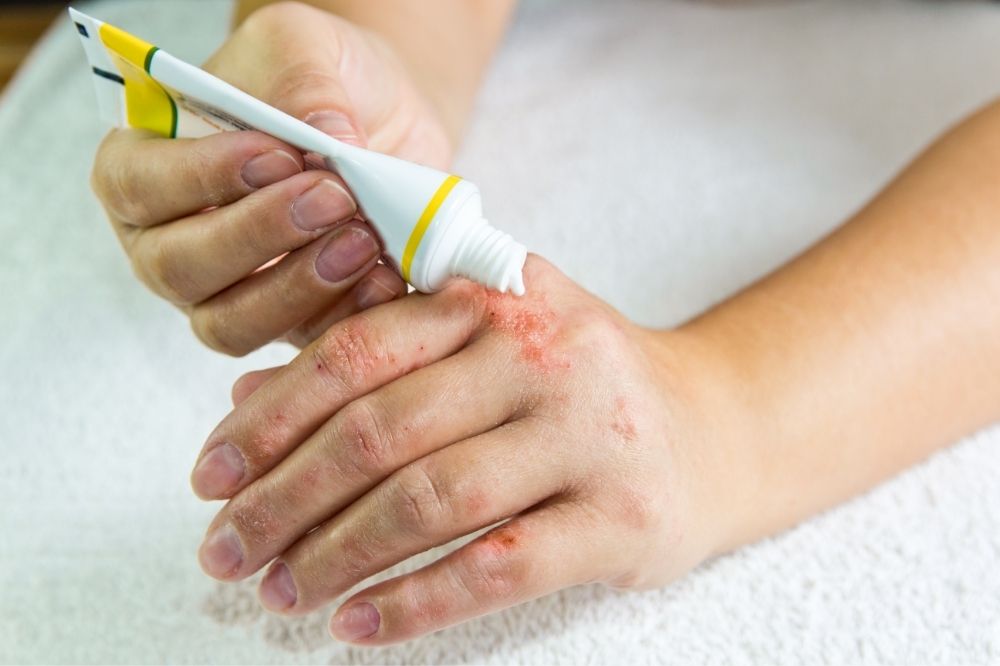Hand Eczema
Eczema is often seen on the hands, as the hands are our part that comes into contact with the outside world the most.
The palms, backs of the hands and/or fingers are the most common sites. It appears as dryness, redness, dandruff, blisters and watery sores on the hands.
Hand eczema; It most commonly develops due to skin irritation after excessive contact with water, dry air, soap, detergent, chemicals, rubber gloves, and personal care products. It develops more easily in people with allergic predisposition such as atopic eczema.
Some occupational groups are more prone to develop hand eczema because they are more frequently exposed to irritants and allergens. Hobbies are as important as a person’s profession.
In these occupational groups; It is more common in people who are busy with cleaning and dishes, bakery workers, hairdressers, dental technicians, health personnel such as doctors and nurses, those who deal with cement, brick and paint work, painting, model, garden work, etc.
What are the Symptoms of Hand Eczema?
- In the acute (initial) period; A large number of fluid-filled blisters on a red and swollen surface and their rapid oozing causes wetness and crusting. • In the subacute (following the acute period) period; Numerous dandruff and crusting are observed on a slightly reddened surface. • In the chronic (advanced) period; the skin is thickened and dandruff is evident on it, cracked skin may develop. Depending on the cause of the disease, it can progress in different periods and itching can be seen in every period.
How Is Hand Eczema Diagnosed?
Most of the time, examination findings are sufficient. Fungal examination and skin biopsy may be required to differentiate it from other diseases. When allergic contact eczema is considered, a patch test can be performed to evaluate the responsible substances.
What are the Hand Eczema Treatment Options?
The mainstay of treatment is to identify the cause and to avoid contact with this agent. It can be difficult at times to stay away completely. Whatever the cause, it is necessary to avoid triggering factors that can worsen the condition for a successful treatment in eczema. Before starting the treatment, the doctor should be informed about pregnancy, breastfeeding, internal diseases, drugs used regularly for different reasons.
- Topical steroid creams applied directly to the skin are useful in the improvement of itching and redness, and in the healing of eczema.
- If the disease is very severe, steroids can be given either by mouth (orally), through a vein (intravenously) or into a muscle (intramuscularly), in addition to topical treatments.
- If there is no response to these treatments, other treatment options such as pimecrolimus, cyclosporine, methotrexate and phototherapy can be applied.
How to Avoid Eczema Triggers?
- Prolonged contact with water and soap causes the loss of the natural protective layer of the skin. For this reason, it is more appropriate to clean hands with an odorless and colorless cleanser suitable for the pH of our skin, rather than soap.
- It is better to wash hands with lukewarm water instead of hot or cold water.
- Especially in the chronic form of eczema, moisturizers can help restore the moisture lost by the skin. By creating a barrier, creams and foams can physically prevent agents from entering the skin.
- Removing the rings while working will prevent irritants from accumulating under the rings.
- Auxiliary equipment and/or dishwasher and washing machine should be used for cleaning, dishwashing and child care.
- It is important to use prophylactic gloves in short-term. It should be noted that the use of gloves for a long time can increase sweating. It will be appropriate to wear cotton gloves inside the gloves. Powdered gloves are not suitable for use as they may exacerbate clinical findings.
- Wearing gloves for a short time while shampooing hair will reduce the negative effects of weak irritants on the skin.
- During applications such as cleaning the toilet, the contact of hands with detergent should be
- Direct hand contact with substances such as tomatoes, oranges, lemons should be avoided.
- It is important to avoid and protect possible allergens during hair dyeing.
- If occupational eczema is considered, a short-term job change may be considered, and if there is a permanent problem, a permanent job change may be brought to the agenda with the recommendation of physicians.




